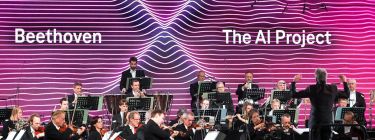
Our Ode to Creativity
Dr. Matthias Röder, Managing Director of Karajan Institute, Co-Founder of Sonophilia Foundation; Seda Röder Founder of Sonophilia Foundation, Salzburg
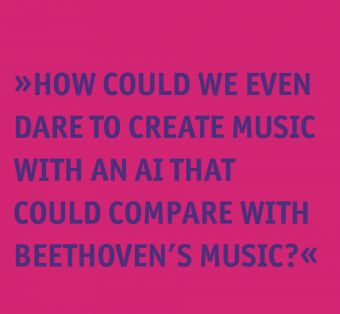
Our Ode to Creativity
In 2019, Michael Schuld of Deutsche Telekom asked whether an AI could be built to finish Beethoven’s 10th Symphony—a revolutionary homage and a birthday gift to Beethoven by the Bonn-based company bringing together technology, arts and communications. In this piece we reflect on the aspirational benefits of a “creative AI” and the reactions of recipients from different milieus. Although general audiences embrace the endeavour, cultural conservatives argue to exclude AI from entering the genius-oriented realm of creativity. Fear seems to be omnipresent, oblivious to the fact that Beethoven AI is a tool—like printing in the 15th century. In this short essay we make the case of how to put AI-supported Art to use for a human-centric Renaissance.
Picture above: Copyright Deutsche Telekom / Norbert Ittermann
Finishing Beethoven’s 10th Symphony with AI support would be monumentally complex—we knew right away. This is for two reasons. First, there exist only a very small number of sketches for the symphony and they are for the most part in a fragmentary state. Therefore, understanding Beethoven’s intentions for this 10th symphony is difficult. Second, honouring what Beethoven had already written, but keeping in mind his incredible versatility in working with musical material, required a very flexible and unique kind of AI that did not yet exist. As we started the project, however, a third complexity emerged to outtrump all others. Beethoven was seen as one of the pinnacles of human creativity and we were receiving criticism even before one tone was played: How could we even dare to create music with an AI that could compare with Beethoven’s music?
Two years later, in October 2021, Beethoven X – The AI Project was premiered, at Deutsche Telekom’s headquarters in Bonn. Thousands of people around the world followed the live stream along with hundreds in the audience. Not one person in the crowd was able to tell where exactly the sketches of Beethoven ended and where the music of the AI took over. Standing ovations filled the hall for many minutes… Music aficionados, technology enthusiasts and distinguished media outlets such as CNN, BBC, BILD and many more from around the globe seemed to love the result, while the album entered the German pop charts.
Nonetheless, following the premiere, a heated discussion broke out.The conservative feuilletonists and hardcore traditionalists labeled Beethoven X as “sacrilege” and were particularly bitter in their judgement. Going over the music motif by motif, they discussed whether our AI matched Beethoven’s “genius” music, or whether it was just an unemotional imitation of the original—often confusing and criticising the original fragments with music produced by the AI. The discussion however showed striking similarities to the criticism that others have received for creating their completion of Beethoven’s 10th symphony. That’s when we realised that the whole debate was clearly not about the music itself nor about the capabilities of the technology—it was about excluding AI (and sometimes even humans) from entering the genius-oriented realm of creativity.
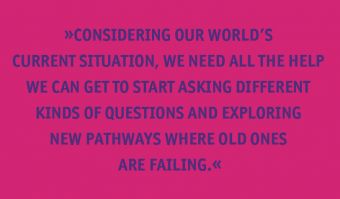
But Beethoven X heralds a future where there are no barriers of entry into the ivory tower of arts. It foreshadows a new kind of Renaissance that is all about democratising creativity for all rather than making it a privilege for a few. Most importantly, Beethoven X aspires to be part of a future where humans and machines interact productively so that more people can harness the benefits of technological tools to unleash creativity, to self-actualise and to contribute to humanity. Technologies are advancing rapidly. Therefore, unleashing their potential for the greater good is, quite frankly, a pressing matter. We should, perhaps, be maximising the creative potential in the world with much more urgency. Consider this: according to the numbers compiled by the Austrian Statistics Agency, only 0.02% of the entire world population is working in any innovation and creativity-related field—R&D, environment, food, societal innovation, arts… you name it!
But can it truly be that only one in 5,000 people are actually creative? Can it truly be that only one in 5,000 people can contribute to innovation or to arts? Of course not!
We live in a world obsessed with not wasting resources, yet when it comes to human potential, we seem somewhat complacent. Considering our world’s current situation, we need all the help we can get to start asking different kinds of questions and exploring new pathways where old ones are failing. That is precisely where the power of human-machine interaction lies.
Our Beethoven AI gave us options, options we could never have produced without it in such a timeframe. In so doing, it maximised our creativity. The options it so effortlessly produced were threefold. First, they expanded our horizons in that AI didn’t care about our conventions, taboos, or rules. Second, they gave us freedom, putting us in the driver’s seat with an amazing array of choices.
Finally, they saved us tons of time which we could spend focusing on and learning about things that really matter. All of that is indeed “human” music to our ears.
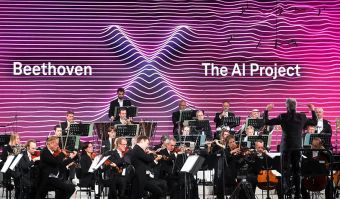
If an AI can help humans be more creative—more “human” even—the question remains: Why are we not employing this technology much more widely to address and solve other problems too?Perhaps the answer is that our age lacks courage. Business-as-usual mentality and fearing failure is omnipresent in our organisations. Many are reluctant to experiment with AI within the context of creativity. Or maybe the fear lies in the idea of a machine becoming a “more creative individual” than us, as if we were in competition.
Humans are not computers, nor should they be treated as such. Unfortunately, this is still the case: just look at your child’s homework sheet, and you’ll immediately know what we’re talking about. Our systems should be focusing more on raising first-class creative and collaborative thinkers, learners and inventors, rather than programming what are essentially second-class calculators.
Picture left: Copyright Deutsche Telekom / Norbert Ittermann
Let’s accept the reality: Humans are generally not very good at reproducing Knowledge 101. Our memory capabilities and speed of data-processing are simply flawed in comparison with machines. But we excel at other things, particularly at empathy and creativity. We are also extremely good at unleashing the potential of all sorts of tools around us: We invent tools to improve the lives of people we’ve never even met. We utilise tools all the time to inspire and connect with each other. Our Beethoven AI is one of them.
This is a turning point in history. Instead of asking whether someone is “allowed” to use AI in the creative process or to emulate the style
of a creative superstar, we should be instilling the right mindset and the joy of experimentation to awaken the creative superstar inherent in everyone. It is high time we stop putting people into boxes only to later instruct them to think outside of the box!
As the debates and reflections around our Beethoven experiment unfold, we must begin acting on that promise.
Our world is slowly coming out of the Industrial Age, but what’s next is not the age of technology, digitalisation, or transhumanism.
It’s the Age of Creativity!
Matthias Röder
Dr. Matthias Röder is an award-winning music and technology strategist. He is Co-Founder and Managing Partner at The Mindshift, a consultancy on creative leadership and innovation strategy. Matthias currently serves as a board member of the Karajan Foundation and is the Managing Director of the Eliette and Herbert von Karajan Institute. He is also a member of the board of trustees of the Mozarteum Foundation. In 2017, Matthias founded the Karajan Music Tech Conference, a cross-industry event to promote breakthrough technologies in music, media and audio. He is also the founder of the Classical Music Hack Day series which he launched in 2013. Together with his wife, Seda Röder, Matthias co-founded the Sonophilia Foundation, a non-profit that promotes a scientific approach to creativity. Matthias has won numerous prizes and accolades for his work, including most recently, the “Game Changer” Award of the Chamber of Commerce Salzburg. He is a sought-after speaker and lecturer who has taught at Harvard University, the Change & Innovation Management Program at University of St. Gall, and Salzburg University. He holds a PhD in music from Harvard University and is an alumnus of the Mozarteum University Salzburg.
Picture © HUBERT AUER Salzburg
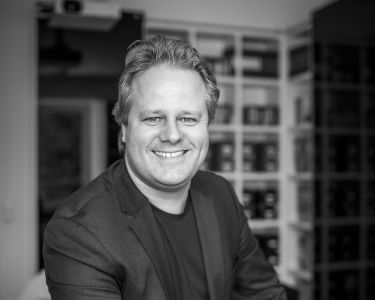
Seda Röder
Seda Röder, aka “the piano hacker”, is an author, entrepreneur and philanthropist devoted to cultivating creativity in society and organisations. She is a sought-after speaker, consultant to DAX listed companies and the founder of the Sonophilia Foundation; a non-profit organization dedicated to advancing the scientific research of creativity and critical thinking. Seda is Co-Founder and Managing Partner at The Mindshift, a consultancy on creative technologies and change leadership. Furthermore, Seda is a fellow and a member of the Salzburg Global Seminar Corporate Governance Forum, angel investor and network partner at the European startup accelerator Silicon Castles. In 2018 Seda received the Game Changer Award at the Austrian Chamber of Commerce for her business merits. Before relocating to Europe, Seda taught music performance, theory and history at Harvard University and Massachusetts Institute of Technology (MIT) as an Associate and Affiliated Artist.
Picture © Private Collection

